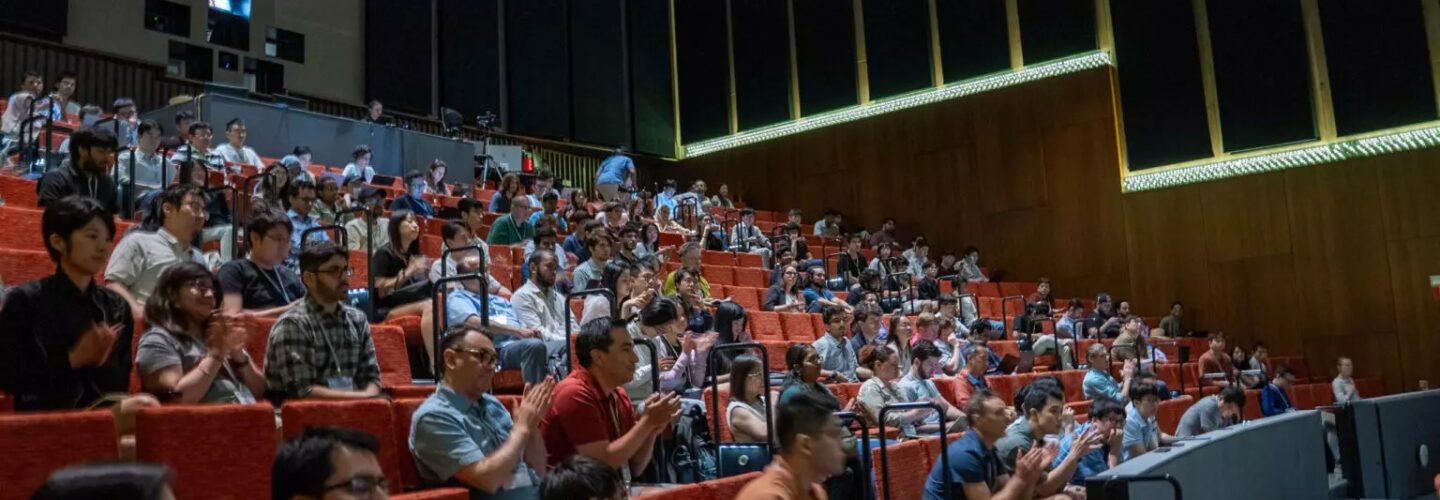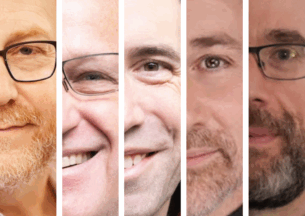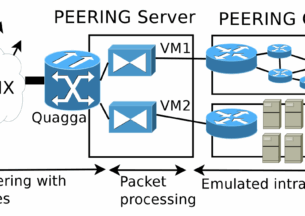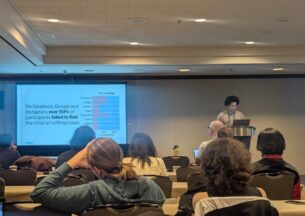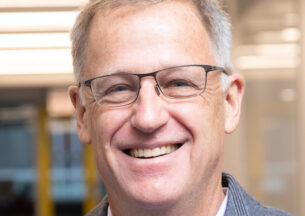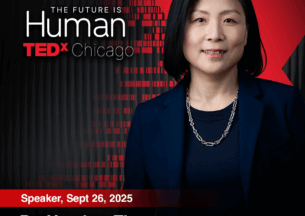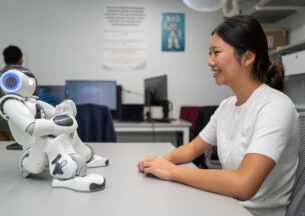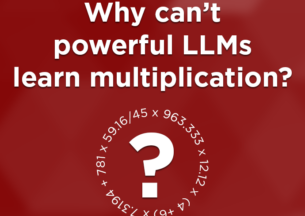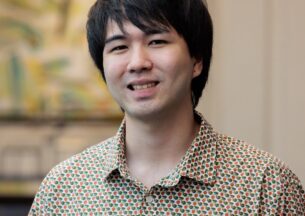2025 Midwest Machine Learning Symposium Demonstrates Regional Excellence
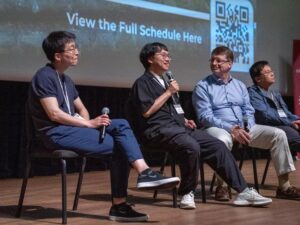 The University of Chicago hosted the 2025 Midwest Machine Learning Symposium (MMLS) at the Reva and David Logan Center for the Arts June 23rd and 24th. Gathering over 250 researchers from across the region for two days of talks by experts in the field, poster presentations by up-and-coming researchers, and opportunities for networking, the annual event cultivated and showcased talent at all stages and fostered cross-institutional collaboration.
The University of Chicago hosted the 2025 Midwest Machine Learning Symposium (MMLS) at the Reva and David Logan Center for the Arts June 23rd and 24th. Gathering over 250 researchers from across the region for two days of talks by experts in the field, poster presentations by up-and-coming researchers, and opportunities for networking, the annual event cultivated and showcased talent at all stages and fostered cross-institutional collaboration.
MMLS brought together diverse perspectives, from theoretical computer scientists to applied researchers, from industry practitioners to academic scholars. Sessions illustrated the breadth of machine learning research happening across the region, and reflected both technical innovation and a dedication to responsible innovation.
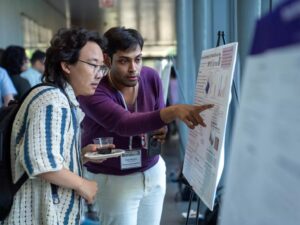 MMLS is committed to spotlighting and encouraging work by junior researchers and students, with dedicated “Lightning Talks” and poster sessions. Lightning Talk speakers included UChicago and Toyota Technical Institute at Chicago (TTIC) researchers Raphael Rossellini, Justin Wang, Chenxiao Wang, and Shuo Xie who covered areas from theoretical foundations to practical applications. Four poster sessions featured research by more than 75 students spanning topics from strategies to debias high-stakes decisions to an optimization tool designed to support financial decision-making, and gave attendees an opportunity to share ideas and build connections.
MMLS is committed to spotlighting and encouraging work by junior researchers and students, with dedicated “Lightning Talks” and poster sessions. Lightning Talk speakers included UChicago and Toyota Technical Institute at Chicago (TTIC) researchers Raphael Rossellini, Justin Wang, Chenxiao Wang, and Shuo Xie who covered areas from theoretical foundations to practical applications. Four poster sessions featured research by more than 75 students spanning topics from strategies to debias high-stakes decisions to an optimization tool designed to support financial decision-making, and gave attendees an opportunity to share ideas and build connections.
The 2025 Symposium also featured plenary speakers at the cutting edge of ML research across each of their domains:
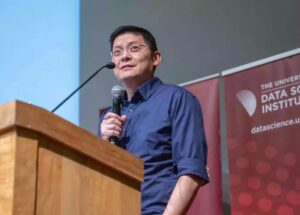 Ben Zhao (University of Chicago) – Named to TIME Magazine’s TIME100 AI list, Zhao is a UChicago Computer Science professor whose work has led him in a direction he didn’t expect: advocacy for artists. Zhao spoke to the impacts of previous waves of innovation in computer science and what’s different this time, and shared the effects of AI he’s witnessed on independent artists. He also spoke about his team’s work on tools like Nightshade and Glaze to help artists protect their work from unauthorized AI model training, and the role the rising generation of engineers can play in mitigating the risks of AI.
Ben Zhao (University of Chicago) – Named to TIME Magazine’s TIME100 AI list, Zhao is a UChicago Computer Science professor whose work has led him in a direction he didn’t expect: advocacy for artists. Zhao spoke to the impacts of previous waves of innovation in computer science and what’s different this time, and shared the effects of AI he’s witnessed on independent artists. He also spoke about his team’s work on tools like Nightshade and Glaze to help artists protect their work from unauthorized AI model training, and the role the rising generation of engineers can play in mitigating the risks of AI.
Tuomas Sandholm (Carnegie Mellon University) – Most real-world situations are situations with imperfect information. Games such as chess have long served as a benchmark for AI’s progress, and there have long existed imperfect information versions that require reasoning about information gathering as well as knowledge about one’s opponent: what they know, signal, or bluff on. Sandholm, the Angel Jordan University Professor of Computer Science at CMU and co-director of CMU AI, presented the latest advances in AI reasoning in cases of imperfect information, as demonstrated through examples from “Fog of War” chess. He presented his team’s work developing Obscuro, the first superhuman AI for fog of war chess, which shows strong reasoning even without the construction of a common knowledge set.
Heng Ji (University of Illinois Urbana-Champaign) – Ji, Professor of Computer Science and Founding Director of the Amazon-Illinois Center on AI, discussed recent advances in block-based chemistry that involve breaking down molecules into building blocks (i.e., functional modules) and reassembling them into new molecules with desired functions. This offers the possibility to manually design drugs and materials. Ji shared her team’s work developing a prototype that employs multistep critical reasoning to rethink and resurrect “fallen angels:” pharmaceuticals that showed efficacy but ultimately failed clinical trials due to adverse effects. Of the 16 molecules the team analyzed, eight were able to be reformed, an outcome that offers the possibility to transform the notoriously time and money-intensive process of drug discovery.
Sanjeev Arora (Princeton University) – Arora, the Charles C. Fitzmorris Professor of Computer Science and Director of Princeton Language and Intelligence, discussed how far LLMs have come in their problem-solving capabilities, and where they might go next. To learn how to think critically, humans need to be able to think about thinking and, Arora argued, the same is likely the case for LLMs, in which such “metacognition” tends to arise spontaneously.
As machine learning continues to reshape industries and society, MMLS is dedicated to ensuring the Midwest is an active participant with its annual conferences. We hope you’ll join us next year for MMLS26, hosted by Purdue University.
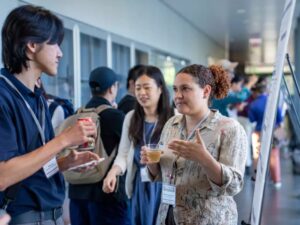 Many thanks to our sponsors, whose support made the event possible:
Many thanks to our sponsors, whose support made the event possible:
Platinum:
Schmidt Sciences; the Data Science Institute, the Department of Computer Science,
Gold:
Department of Statistics at the University of Chicago; the Toyota Technical Institute at Chicago;
Bronze:
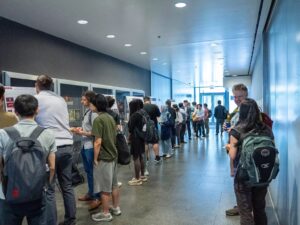 Invenergy, Promega; the Center for Applied Artificial Intelligence at the University of Chicago Booth School of Business; the Data Science Institute at the University of Wisconsin-Madison;
Invenergy, Promega; the Center for Applied Artificial Intelligence at the University of Chicago Booth School of Business; the Data Science Institute at the University of Wisconsin-Madison;
Meal/Break Sponsors:
Center for Applied Artificial Intelligence at the University of Chicago Booth School of Business; Michigan State University.
This story was originally published by the Data Science Institute.


